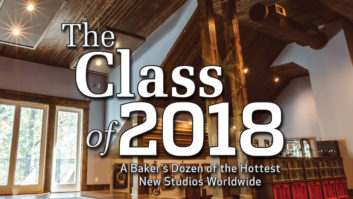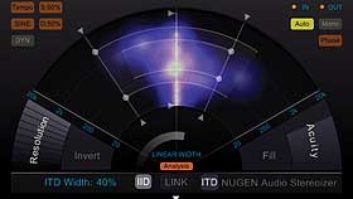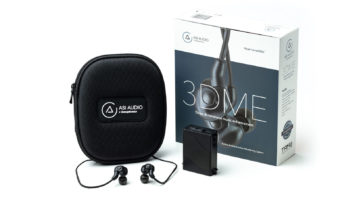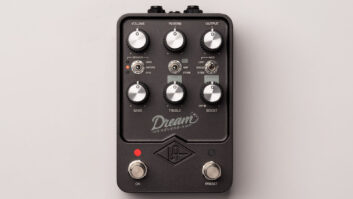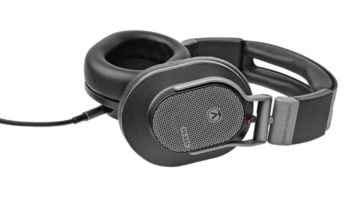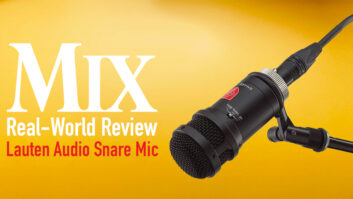NUGEN Audio expands its fine collection of intuitive tools for audio analysis and processing for modern professionals with Stereo Pack, a bundle that provides essential software plug-ins for stereo image enhancement, correction, precise low-frequency control and more. The package includes Stereoizer 3, Monofilter 4 and Stereoplacer 3, all available in 64-bit macOS running AAX, as well as VST3 for PCs.
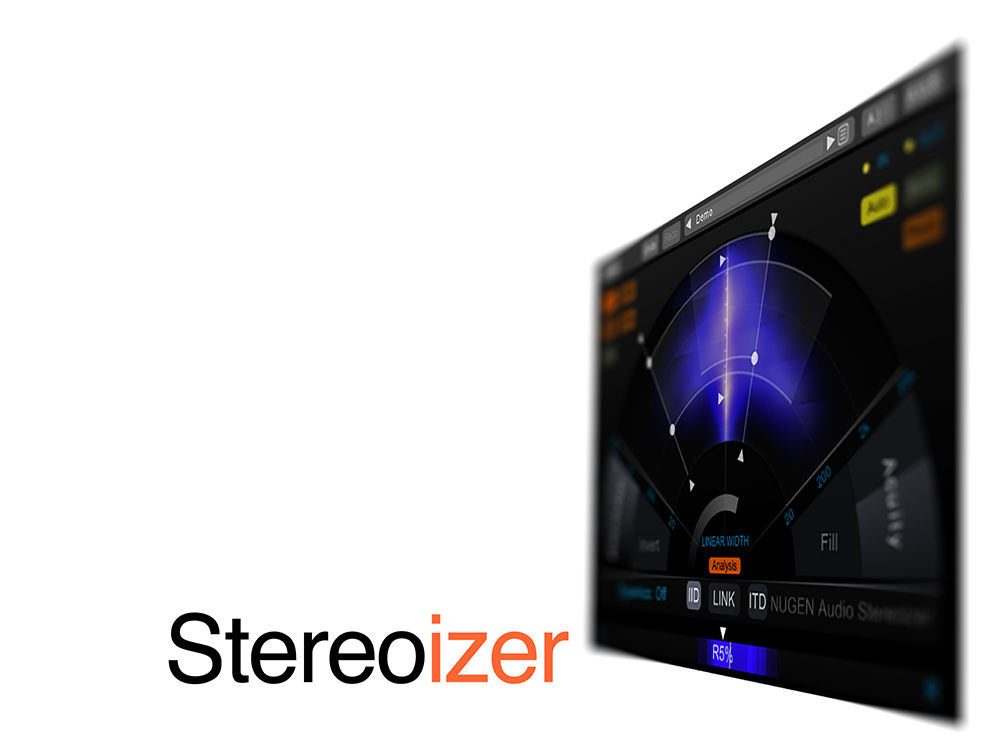
Stereoizer 3
First up is Stereoizer, a stereo field/image manipulation tool that allows adjustment of the two main components of stereo sound: Inter-aural Intensity Difference (IID) and Inter-aural Time Difference (ITD).
With IID, sound is localized because of the difference of level between the left and right channels; users can manipulate the relative levels of left and right across an adjustable frequency range.. With ITD, sound is localized using the difference in the arrival times of sounds coming from the left and right channels, so users alter the relative time arrival difference, also across an adjustable frequency range. Both processors are usable and adjustable separately or will function together.
In Pro Tools HDX 2018.4, I inserted Stereoizer on a finished mix track and set the upper and lower frequency bounds of the IID effect and left the ITD effect off. There is the adjustable resolution “wedge” for adjusting the effect’s density, and the focus parameter will constrain the range (or not) in which the IID algorithm operates.
The plug-in is beautiful. The Stereometer shows a hazy cloud histogram of instantaneous stereo positions displayed as a ghostly, apparitional panorama between the left/right extremes. Brighter bursts indicate the focus of stereo energy; this is especially visible with centered mono signals.
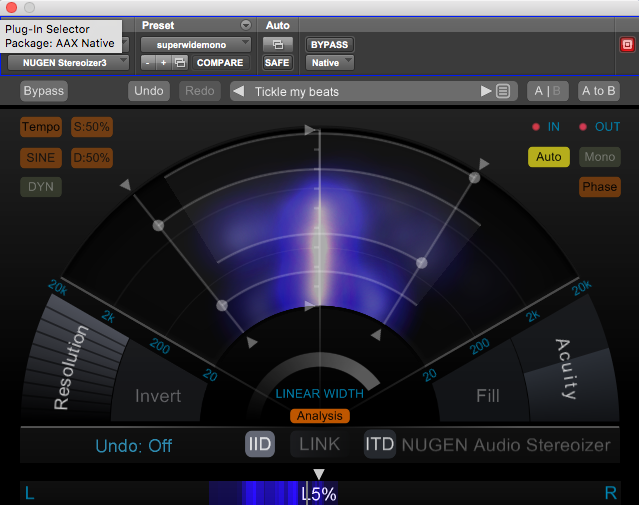
Adjusting ITD, the time difference, between left and right channels has to be subtle if it is to preserve mono capability. It is not like using a Haas effect or phase shifting. As in the IID algorithm, you can adjust the upper/lower frequency bands but now add the ITD width parameter that increases/decreases the effect. ITD Acuity and Fill are fine-tuning controls that set sharpness and density.
The linear width control works to expand/contract the existing stereo information available in the source audio. It is neutral at 100 percent and collapses toward mono with values less than 100 percent or widens out with values above 100 percent. This control works globally for both ITD and IID together.
Using Stereoizer on completed mixed songs or individual mono and/or stereo tracks is easy. I found it perfect for widening mono pad tracks where I had added stereo delays, chorus and Haas effects. I liked the reassurance that no matter how wide it sounded in stereo, it was mono compatible—there is a button to check out the effect in mono right on the GUI! This is awesome!
Related: Review: Mastering Reference Tools, by Brandon T. Hickey, Dec. 14, 2017
Stereoizer also has a dynamics feature to introduce left/right movement modulation. You can tempo-lock in subdivisions and you have a choice of sine, triangle, square or random wave modulation sources. For my music mixing, using this on individual stereo instruments is a winner. It can be ever so subtle and not intrusive at all.
Stereoizer has a great collection of evocatively named presets to choose from, and some of them can dramatically increase output level. The Auto button automatically compares input to output levels and matches; I found this to work best when adding a Stereoizer effect late in my mix process—there was no need to reset or redo automation moves for newly processed tracks.
There is also an adjustable global stereo balance control with an instantaneous readout of L/R balance and a way to solo just the left or right channels individually. I found this useful in troubleshooting stereo instruments and drum kit recordings that unexplainably went off-balance.
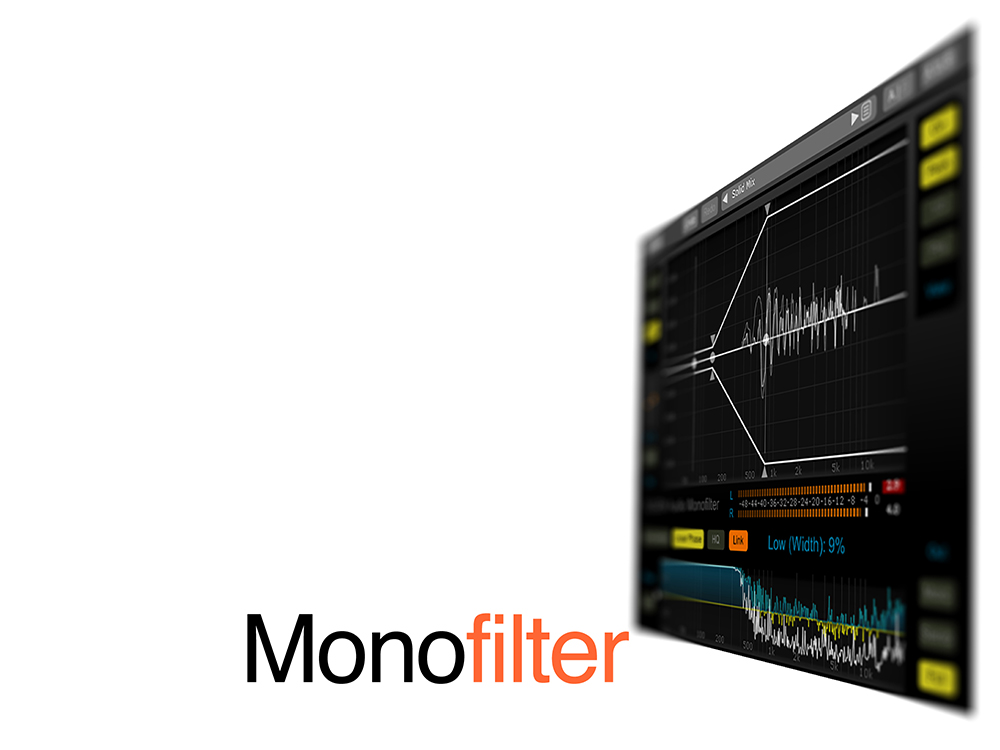
Monofilter 4
As its name implies, Monofilter uses a filter algorithm to control stereo width and phase correlation in the spectrum area below the “higher up” localization frequencies. There is a choice of a zero latency filter, linear phase for the best quality but with slight processing delay, and HQ mode for high-definition but more CPU usage.
The real-time GUI shows stereo width above and below the center (mono) component of the stereo field. You first set the HPF cutoff frequency to remove all frequencies below it. Then you may set the low-frequency node below which all audio will be mono. The GUI shows frequencies on the X-axis, although they are a bit hard to read. You can see how narrow the stereo field becomes in the graphic, just where it starts to open up into full stereo.
I used Monofilter on a sustaining stereo pad that I had developed through a nice mix of stereo effects using reverb, multitap delays and chorus. But there were a few bass notes the musician played that were “phasey”-sounding. Rather than compromising the full sound of the pad by just using a conventional highpass filter, I used Monofilter.
I set the transition “ramp up” or stereo width envelope from a HPF corner frequency below; stereo sound is constrained using the low-width control. From this “wide mono,” I set it to open all the way up to full stereo width; this can ramp up suddenly and instantly if you desire.
Visually, you can see exactly where to set this point, and it is adjustable relative to frequency with the high width control. You may find on certain sources, it is better to allow Monofilter’s effect to “ease in” for a less noticeable treatment.
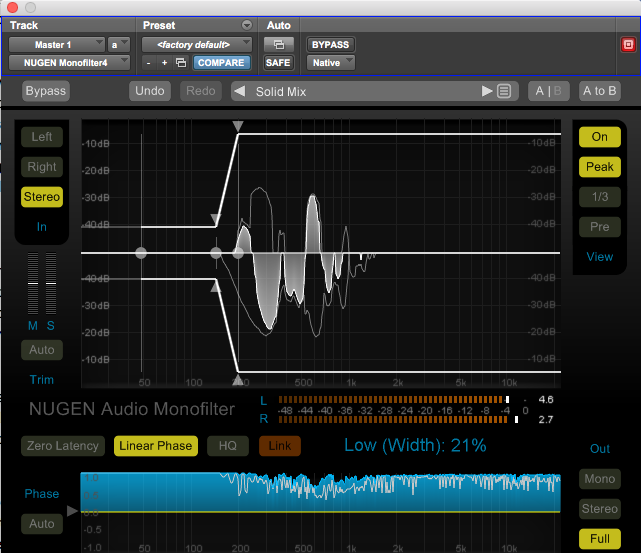
In linear phase mode, there is a phase correlation fader to set the amount of relative phase correction of the L/R channels by comparing the stereo input source to Monofilter’s output, or do what I do and just use auto phase to adjust for maximum correlation automatically. The plug-in has a beautiful “correlation relative to frequency” display where you can compare the input phase to the output easily.
Related: NUGEN Audio Helps Re-Recording Mixer Sreejesh Nair Preserve Creative Intent, Jan. 4, 2018
I found Monofilter valuable for taking care of problems with suspect recordings of full-range instruments such as grand pianos, Hammond organs and low string sections. Unwanted phase inconsistencies are easily taken care of; low frequencies can sound more centered and solid within the mix. Monofilter was especially useful in controlling recordings with unfortunate room resonances that led to certain bass notes causing modal ringing.
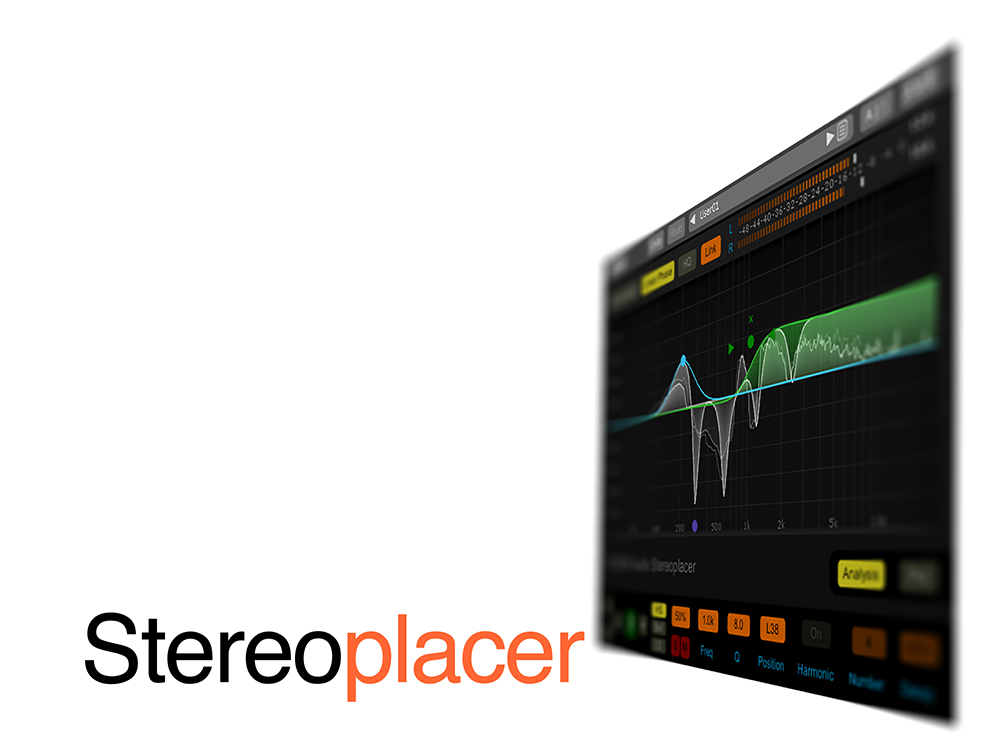
Stereoplacer 3
Stereoplacer redistributes the stereo balance by frequency in a practical way. Up to 10 color-coded parametric nodes can be used at the same time. When any node is selected, a detailed control zone indicates its filter type (be it bell, or high or low shelving curve), its center frequency, Q or resonance in the case of a shelving equalizer, and current panned position.
In addition, you may solo or mute any of the EQ nodes and control the level of the background relative to the selected EQ band while in solo. This feature in 0 percent is true solo of just the frequency and its current panned location.
The interesting harmonics section allows up to 10 equally spaced, harmonically linked bell curves based on the root frequency and pan position of the selected EQ node. There is also a delay percentage that increases (at 0 percent) or decreases (at 100 percent) the relative positional level of the subsequent added curves. (Trust me here, you have to hear and see the visual representation of this on the GUI.)
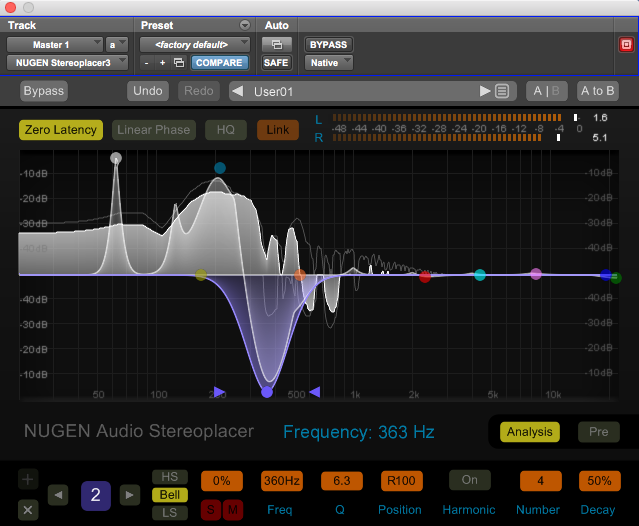
Stereoplacer finishes with an output meter to show clips and the ability to do a spectrum analysis before and after the stereo redistribution. Stereoplacer is a fascinating tool and so far I’ve been using it for automating panned EQ effects in sound design projects.
Product Summary
Company: NUGEN Audio, www.nugenaudio.com
Product: Stereo Pack
Price: $269 MSRP; individual plug-ins sell for $119 each
Pros: Indispensable stereo analysis and correction
Cons: None
